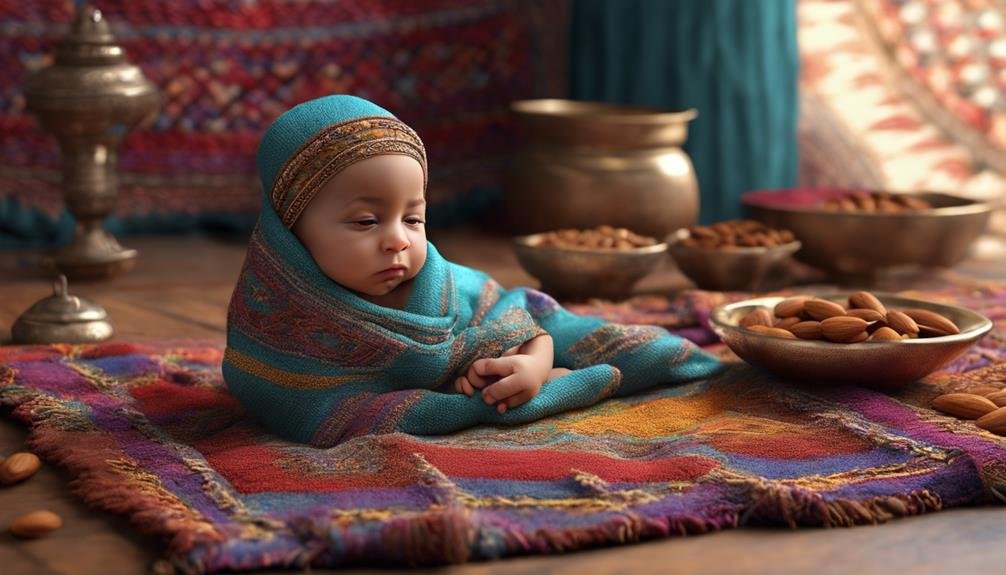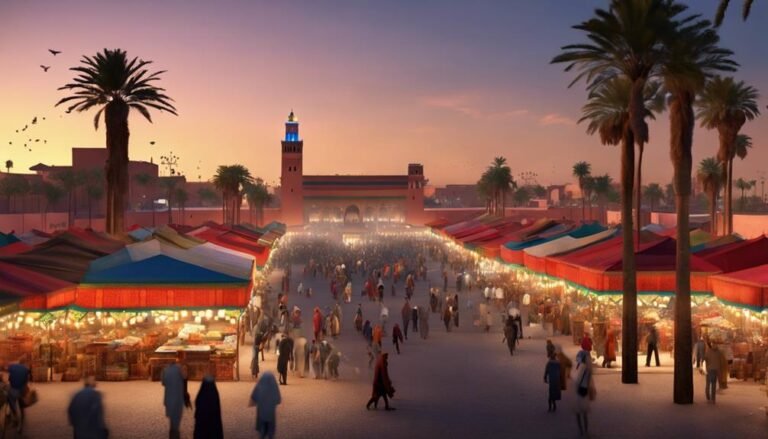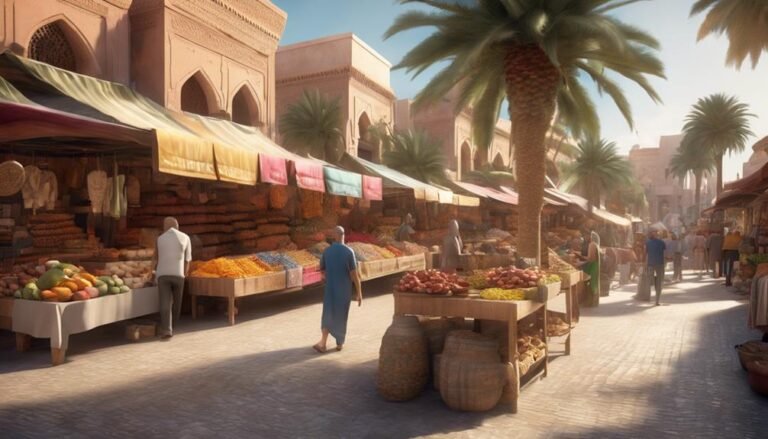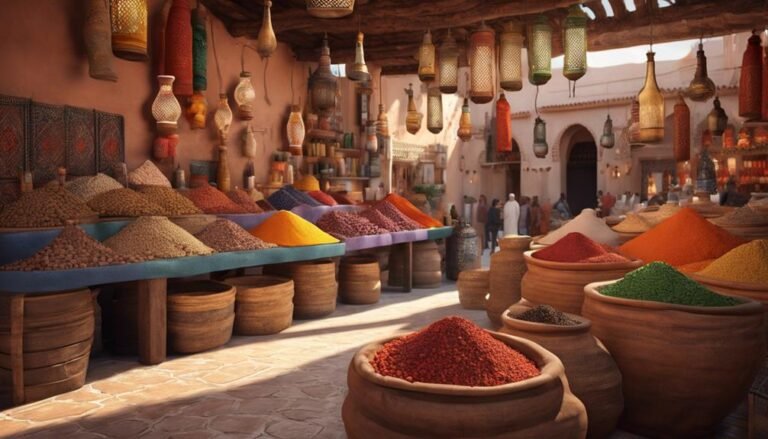Immerse yourself in Moroccan traditions for newborns where ceremonies rich in heritage welcome the baby. Families unite for elaborate celebrations, reciting prayers, and Quran verses. Symbolic gifts like henna and olive oil bestow health and guidance. Community support shines through gifts like sugar for a sweet life. Family bonds play an essential role, passing on values and traditions. Postpartum care emphasizes well-being using herbal remedies and traditional medicines. Discover the intricate tapestry of Moroccan traditions enveloping newborns in celebration, symbolism, and community support.
Key Takeaways
- Symbolic gifts like henna and eggs bless newborns with health and prosperity.
- Family plays a pivotal role in welcoming newborns, offering support and passing on traditions.
- Moroccan birth traditions focus on promoting newborn health and well-being.
- Protecting newborns from the evil eye is common through rituals and amulets.
- The choice of a newborn's name is believed to influence their destiny and character.
Traditional Moroccan Baby Naming Ceremony
In Moroccan culture, the Traditional Moroccan Baby Naming Ceremony is a significant event that showcases the rich heritage and values of the community. Baby naming customs in Morocco are deeply rooted in tradition and hold a special place within the society. Families gather to celebrate the newborn's arrival by organizing elaborate ceremonies filled with symbolic rituals and heartfelt celebrations.
During the baby naming ceremony, various celebration rituals take place. One common tradition is the recitation of prayers and verses from the Quran, symbolizing blessings and protection for the newborn. Family members and friends come together to offer their well-wishes and blessings to the child, creating a sense of unity and community. Additionally, traditional Moroccan music and dance are often part of the festivities, adding a joyful and lively atmosphere to the event.
Comparatively, the Traditional Moroccan Baby Naming Ceremony differs from Western naming ceremonies by placing a strong emphasis on religious and cultural customs. The event serves not only as a way to name the child but also as a way to instill cultural values and traditions from a young age.
Symbolic Gifts and Blessings for Newborns
Symbolic gifts and blessings play a significant role in traditional Moroccan ceremonies celebrating newborns, adding layers of meaning and cultural significance to the event. Parents often receive symbolic gifts such as henna, eggs, or milk as a way to bless the newborn with health, prosperity, and protection. These gifts symbolize fertility, purity, and nourishment, reflecting the community's wishes for the child's well-being. Additionally, parental guidance is emphasized through the presentation of items like olive oil, representing wisdom and guidance in raising the child.
Community support is also integral, with neighbors and relatives offering gifts like sugar to symbolize a sweet life or salt for a flavorful and seasoned journey ahead. These gifts not only serve as tokens of celebration but also as reminders of the interconnectedness within the community. The act of giving such symbolic gifts and blessings reinforces the importance of unity, support, and shared responsibilities in nurturing the newborn within the Moroccan cultural context.
Importance of Family in Moroccan Birth Traditions
Embracing the core values of unity and support, Moroccan birth traditions place a strong emphasis on the pivotal role of family in welcoming and nurturing newborns. Family support is considered fundamental in Moroccan culture, with relatives playing a central role in providing assistance and guidance to new parents.
Here's why family holds such significance in Moroccan birth traditions:
- Interconnectedness: Families in Morocco are deeply interconnected, with multiple generations living together or in close proximity, fostering strong bonds and a sense of togetherness.
- Emotional Support: Family members offer emotional support to new parents, helping them navigate the challenges of parenthood and providing reassurance during this transformative period.
- Practical Assistance: From household chores to childcare, family members step in to provide practical help, allowing new parents to focus on bonding with their newborn.
- Cultural Transmission: Family involvement ensures the passing on of cultural practices and values, preserving traditions across generations.
- Community Involvement: Beyond the immediate family, the wider community also plays a role in supporting and celebrating the arrival of a new member, creating a network of care and solidarity.
Cultural Practices for Newborn Health and Wellbeing
Family support in Moroccan birth traditions extends beyond emotional and practical assistance to encompass specific cultural practices aimed at promoting newborn health and wellbeing. Postpartum care in Morocco is characterized by a strong emphasis on the well-being of both the mother and the baby. Communities come together to provide support and assistance to new mothers, ensuring they've the rest and care they need to recover from childbirth. This communal approach plays a crucial role in ensuring the health and happiness of the newborn.
Herbal remedies and traditional medicines are often utilized in Moroccan cultural practices for promoting newborn health. These remedies, passed down through generations, are believed to have healing properties that can aid in the recovery and well-being of both the mother and the baby. From herbal teas to natural ointments, these traditional practices are deeply ingrained in Moroccan culture and are seen as effective ways to support newborn health. The combination of postpartum care and the use of herbal remedies highlights the holistic approach that Moroccan culture takes towards newborn health and well-being.
Superstitions and Beliefs Surrounding Moroccan Newborns
In Moroccan culture, there are numerous superstitions and beliefs surrounding newborns that play a significant role in shaping postpartum practices and family dynamics. These traditions are deeply ingrained in the fabric of society, influencing how parents care for and protect their infants.
Here are some key superstitions and beliefs concerning Moroccan newborns:
- Evil Eye Protection: Protecting newborns from the evil eye is a common practice in Moroccan culture. Families often use talismans, charms, or recitations from the Quran to shield the baby from malevolent glances.
- Ritual Baby Baths: Bathing newborns isn't merely a hygiene practice in Morocco; it's often accompanied by rituals believed to cleanse the baby from any negative energy or influences acquired during birth.
- Amulet Wearing: It's customary for Moroccan newborns to wear amulets believed to offer protection from harm and bring good fortune.
- Naming Ceremonies: The choice of a newborn's name is considered important, as it's believed to influence the child's destiny and character.
- Incense Burning: Burning incense is a common practice to purify the air around the newborn and ward off evil spirits.
Conclusion
As you explore the rich traditions surrounding Moroccan newborns, you'll see that family plays a central role in welcoming the new arrival.
From the symbolic gifts and blessings to the cultural practices for health and wellbeing, each tradition is deeply rooted in love and heritage.
Just like a tapestry of customs woven together, these practices create a beautiful mosaic of care and celebration for the newest member of the family.

The Editorial Team is a passionate group of Morocco enthusiasts dedicated to sharing the beauty, culture, and wonders of this captivating country. With diverse backgrounds and a deep love for travel, we strive to bring you engaging and informative content that inspires your Moroccan adventures. From uncovering hidden gems and sharing local insights to exploring mouthwatering cuisine and showcasing the vibrant lifestyle, our team is committed to providing you with valuable resources and exciting stories that enhance your exploration of Morocco. Join us on this journey as we celebrate the rich heritage and unforgettable experiences that make Morocco truly special.







